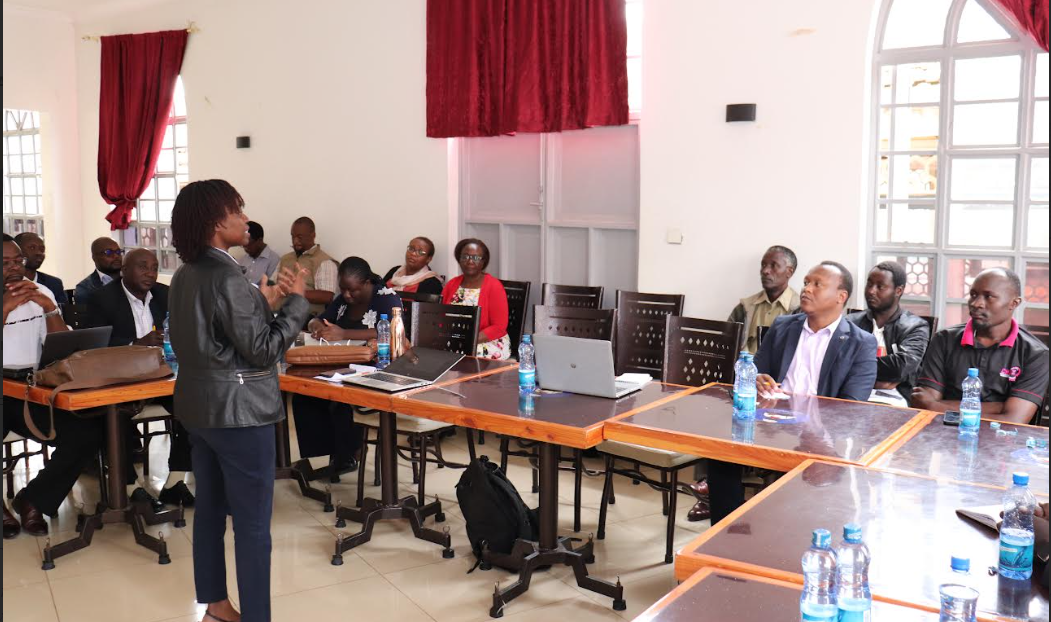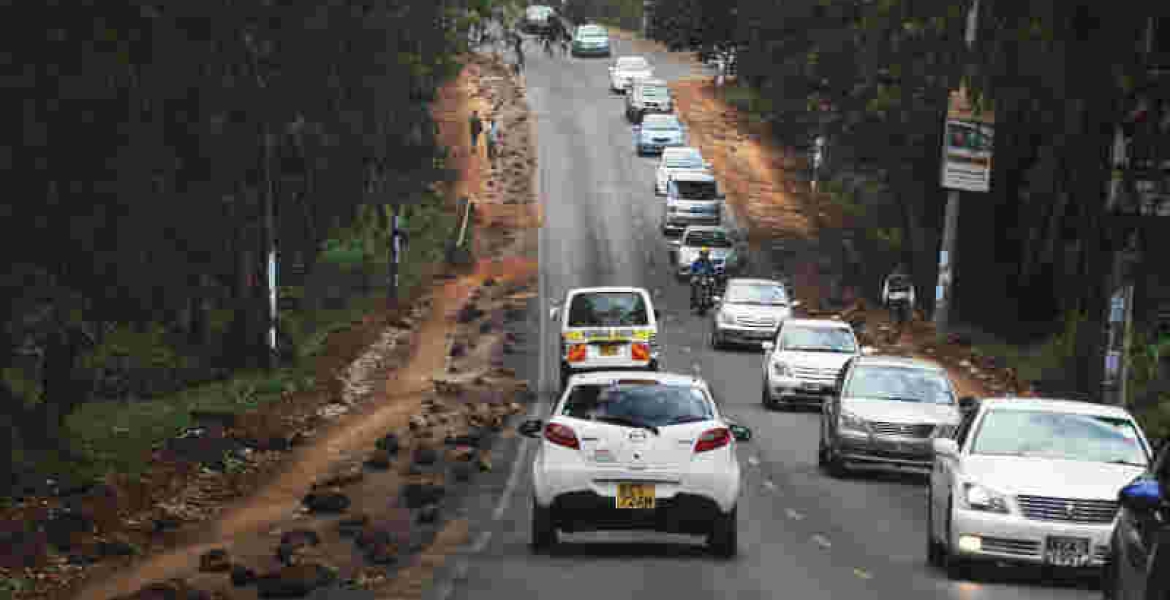
 Officials from the National Government, the Nairobi City County, WRI, and a section of mechanics drawn from Nairobi garages pose for a photo during the workshop in Nairobi./DOMINIC KIRUI
Officials from the National Government, the Nairobi City County, WRI, and a section of mechanics drawn from Nairobi garages pose for a photo during the workshop in Nairobi./DOMINIC KIRUI
As concerns rise about the state of air quality in Nairobi, which is said to cause about 10,000 deaths every year, both state and non-state actors are putting efforts together to ensure that this air remains clean and the residents lead healthier, longer lives.
These efforts have brought about the necessity to look at the causes and drivers of air pollution in Nairobi, and after a series of studies and research around the subject, experts have narrowed it down to the transport sector being the leading source of harmful ambient air pollution.
The World Health Organization of the United Nations (WHO) estimates air pollution to be killing 7 million people every year. Of these, 4.2 million people die from ambient or outdoor air pollution and 3.8 million from indoor air pollution, contributed to by burning wood and charcoal as fuel.
According to Dr. George Mwaniki, the country director and head of air quality at the World Resources Institute, 40% of Nairobi’s air pollutants come from vehicular emissions, making it the largest contributor to the East African city’s bad air quality.
“We installed an air monitor at the Fire Station in the Nairobi CBD last year and what we have gathered is that the air quality shows between 40-80 micrograms per cubic metre. This is higher than the WHO recommended standards of 5 micrograms per cubic metre, translating to more than eight times worse air quality in the city,” Dr. Mwaniki explained.
 Malkia Abuga, the Senior Technical Advisor, Public Health & Community Health Systems at the Nairobi City County, trains mechanics on the health implications of removing vehicle catalytic converters/DOMINIC KIRUI
Malkia Abuga, the Senior Technical Advisor, Public Health & Community Health Systems at the Nairobi City County, trains mechanics on the health implications of removing vehicle catalytic converters/DOMINIC KIRUIThrough the emissions, bad chemical elements from the burning of fuel are released into the atmosphere, adding to it some fine particles that are called particulate matter or PM. The PM is measured in micrometres, and can be 10 micrometres or 2.5 micrometres, depending on the sizes in which they enter the atmosphere.
PM 2.5 is the worst of the particulate matter, as it is dangerous because it is so small it cannot be viewed with the naked eye but only through a microscope.
This, experts warn, is the cause for concern in human health as when inhaled while breathing, it enters the bloodstream through the alveoli in the lungs and thus can cause illness or even death.
Malkia Abuga, the Senior Technical Advisor, Public Health & Community Health Systems at the Nairobi City County government, says that the city spends 30 million shillings annually on the treatment of upper respiratory illnesses.
“These illnesses cause one to take antibiotics because of sneezing or any other symptoms, and its damage is even bigger: it is estimated that by 2050 there will be 10 million deaths because of antibiotic resistance due to frequent use. Also, we would start with first-line antibiotics like Amoxylin, and then we will also move to second-line and third-line antibiotics, which are even more expensive, causing more financial burden to the patient,” she says.
With this in mind, the organisation, working with the Nairobi City County and the Ministry of Roads, organised a training workshop to train mechanics from different garages in Nairobi on the importance of the catalytic converter, a device that most of them remove from the vehicles.
 Mechanics from the informal sector in Nairobi listen keenly during a sensitisation workshop on catalytic converters held in Nairobi./DOMINIC KIRUI
Mechanics from the informal sector in Nairobi listen keenly during a sensitisation workshop on catalytic converters held in Nairobi./DOMINIC KIRUIA catalytic converter is a device placed in the exhaust pipe in petrol vehicles that works by using precious metal catalysts, such as platinum, palladium, and rhodium, to chemically convert harmful exhaust gases from a car's engine into less harmful substances like nitrogen, carbon dioxide, and water vapor. Diesel vehicles have a diesel particulate filter (DPF) instead.
The metals are of high value and have a demand in the black market, thus mechanics steal them from the exhaust system for sale. In other cases, car owners who complain of power loss in their vehicles are advised to remove them so they can experience more power.
When removed, the mechanics will sell the metals to a powerful syndicate for approximately Ksh30,000 to Ksh40,000, unaware of the damage they cause to the environment and the air quality that everyone breathes in the city.
For diesel engine vehicles, car dealers report that when they are imported, they are well-equipped with DPFs until they leave the port after inspection. It is at this point that the DPFs are removed, and they arrive at dealer shops without them.
In December 2024, the World Resources Institute (WRI) carried out a Catalytic Converter Survey through which it found that 71% of mechanics and repair shop operators reported being asked to tamper with or disable emission control devices. 39% of these cases targeted catalytic converters, making them the most frequently tampered devices.
The survey further highlighted that tampering of catalytic converters is concentrated in informal garage clusters such as Embakasi, Eastleigh, Umoja, and Kariobangi. A thriving informal resale market exists, creating strong economic incentives for tampering.
Margaret Kariuki, an air quality consultant who led the research around the city, says that the syndicates controlling these markets are so powerful that they even influence police involvement in trying to stop the theft and trade in mufflers.
“We came across an officer who was dedicated to ending the theft, but his efforts were always frustrated as the syndicates mostly bribed his bosses to bail out criminals he had arrested before he could arraign them in court,” she says.
Samson Otieno, a roadside mechanic in Nairobi’s Donholm estate who was attending the workshop, said that even though cases of mechanics stealing the catalytic converter from clients’ cars are rampant, most clients also ask for theirs to be removed.
“Sometimes a mechanic might come to the garage and ask you to remove their catalytic converter because they say they lose power, especially when going uphill. So the mechanic will end up removing it, not knowing the damage he is doing to the environment, human health, and even the car itself.
 Dr. George Mwaniki, the country director and head of air quality, follows the training workshop on catalytic converters in Nairobi/DOMINIC KIRUI
Dr. George Mwaniki, the country director and head of air quality, follows the training workshop on catalytic converters in Nairobi/DOMINIC KIRUIEngineer Samson Kigen from the Nairobi City County advised that it would help to check on other parts before narrowing down to the catalytic converter as the main cause of power loss.
“First, check some components such as the oxygen sensor, mass airflow sensor, or the spark plugs before going to the catalytic converter. And if the first three are okay and in good condition, the solution would not be to remove the catalytic converter, as it may only be clogged. So, the solution will be to clean it,” he explains.
To clean a car's catalytic converter, one can use a fuel additive designed to break down carbon deposits by adding it to a nearly empty fuel tank and driving for a significant distance at high speeds.
Alternatively, they can remove the converter and clean it manually by spraying it with a pressure washer on the lowest setting, soaking it in a strong detergent solution, or applying a chemical cleaner to dislodge stubborn clogs.
In Nairobi, most drivers complain that their catalytic converters are removed without their knowledge or consent whenever they take their cars to garages or car washes. As a result, most garages have started a preliminary check before they allow their customers to leave their cars with them.
They create a checklist showing all the things that are on the vehicle and those that might be missing, and then have their customers countersign.
Irene Wali, the founder of Chixz Garage on Ngong Road, says that this serves to avoid disputes with customers.
“This is important because in the past, we have heard issues of customers coming back to claim that their catalytic converters were removed, and maybe the garage did not remove them as they might have been removed elsewhere. And also since we run a mostly women’s garage, it's also important to keep their belongings safe when they leave their cars with us,” Wali says.

















